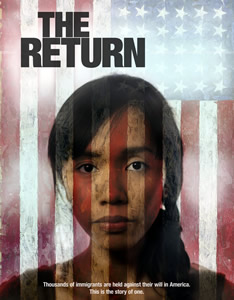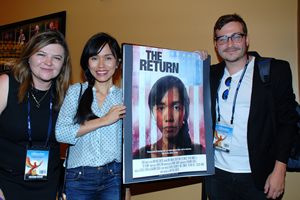Anthem Film Festival: Slavery Is Alive and Well and May Be Living Down Your Street
(First published on Blogcritics.org)
Slavery has become more subtle and is not just something that happens far away in third world countries. This was the message of The Return, a film by director Matthew Szewczyk and producer Chelsea Fenton, which won the “Best Libertarian Ideals, Short Narrative” award at the Anthem Film Festival. The festival, part of FreedomFest, held July 13-16 at Planet Hollywood in Las Vegas, highlights achievements by filmmakers who care about individuality and libertarian ideals.
 The Return takes us into the world of a Filipino house maid, Ligaya, held captive for years by an upper class family in Orange County, California. The story is a composite of several true instances of people being held in this condition. After the Anthem screening, Director Matthew Szewczyk discussed the film and the issues it raised.
The Return takes us into the world of a Filipino house maid, Ligaya, held captive for years by an upper class family in Orange County, California. The story is a composite of several true instances of people being held in this condition. After the Anthem screening, Director Matthew Szewczyk discussed the film and the issues it raised.
The Film
Ligaya is abused, lied to, and told she will be arrested if she tries to escape the home of her middle-eastern captors. Finally, it becomes too much for her to bear, and, with the help of a deliveryman who suspected something was amiss, she tries to make her escape.
Two things particularly impressed me about this film: The artistry of the cinematography and direction and the performance of Aina Dumlao as Ligaya.
I will admit a prejudice for visual storytelling. Certainly, clever dialog (I’m a writer myself) and riveting acting deserve praise, but when a director can tell much of his story with just visuals, that is the ultimate in filmmaking. In The Return, Szewczyk masterfully does exactly that.
Dumlao touchingly brings the captive house maid to life in such a compelling manner that you begin to wonder whether this is an actress you are watching or the actual person of whom the story is about. Performances this good are rare and wonderful.
Dumlao was born in the Philippines, moving to Los Angeles a few years ago. Before deciding to step in front of the camera, she had been directing and producing commercials since 2013.
The Issues
During the question and answer session after the film, director Szewczyk explained that his motivation for making this film was to bring this mostly unknown problem to light. “You pass a house,” he said, “and do you ever wonder, ‘Is there someone behind those doors being held against their will?’.”

Producer Chelsea Fenton, star Aina Dumlao, and director Matthew Szewczyk at Anthem Film Festival
In this country, domestic servants are intimidated by being told that they will be arrested and imprisoned by the police if they try to leave.
According to Szewczyk, this is a much bigger problem than anyone realizes, with thousands of domestic servants being held prisoner in the United States. He cited estimates that of the 21 million victims of human trafficking worldwide, 68 percent are victims of forced labor and 22 percent are victims of forced sexual exploitation. The remaining 10 percent are in state-imposed forms of forced labor.
“Most people don’t know,” Szewczyk said, “that the FIFA World Cup facilities being built in Qutar for the 2022 games are almost entirely the product of slave labor.”
He explained that this is made possible by lax labor laws and the practice of seizing the visas and passports of foreign workers. “When that happens,” he said, “they are not really citizens of anywhere.”
For information about future screenings and the issues raised, check the film’s website or Facebook page. The trailer is linked below.


